The Division of Pulmonary and Sleep Medicine Celebrates Women’s History Month
Published on
Published on
Each March, we celebrate National Women’s History Month, recognizing inspirational and groundbreaking women who have forged a path through history for their female successors.
Though the medical field has come a long way since Dr. Elizabeth Blackwell made history as the first woman in America to receive a medical degree, medicine largely remains a male-dominated field and gender discrimination persists.
In honor of Women’s History Month, the Division of Pulmonary and Sleep Medicine invites you to meet a few members of our talented team — inspiring women across multiple subspecialities sharing their history, their accomplishments and their insights on women in the medical field.
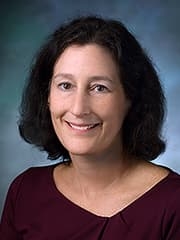 Associate Division Chief; Medical Director Post-preemie Lung Disease Clinic; and Co-director, Rare Lung Diseases Center
Associate Division Chief; Medical Director Post-preemie Lung Disease Clinic; and Co-director, Rare Lung Diseases CenterQ: Who or what inspired you to pursue a career in medicine?
A. When growing up, I was inspired by my general practitioner, Dr. Rohrmayer, who cared for my older sister with severe asthma.
Q: What do you love most about your job?
A. I love caring for my patients and watching them grow up to have meaningful lives.
Q: What professional accomplishment are you most proud of?
A. I’m proud of my research focusing on early lung injury and the factors that influence long-term health outcomes.
Q: How important has female mentorship been to your career?
A. It was important to have female role models who could navigate through the complexities of academic medicine while maintaining a reasonable work-life balance.
Q: Although the gender gap has shrunk in the medical field, we still have more work to do. What obstacles do you feel female clinicians face and how can society promote increased female leadership in the field?
A. Female clinicians have historically occupied lower academic positions compared to men for a variety of reasons. One reason that contributes to this is that women are more frequently the primary caregivers for children and elderly parents. These dual roles often limit their ability to keep up with male colleagues due to strict time constraints for promotion and less flexibility for part-time work. These issues should be addressed in a more concrete manner.
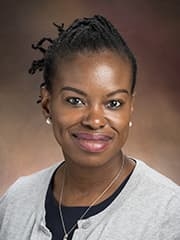 Pediatric pulmonologist with a specialty in sleep disorders
Pediatric pulmonologist with a specialty in sleep disordersQ: Who or what inspired you to pursue a career in medicine?
A. Growing up, I was very sickly. I was in the hospital frequently and I was cared for by a team of amazing doctors and nurses. One of the doctors that cared for me was also a family friend. I was inspired by the way he communicated complex and scary issues with my parents and always allayed their fears. This motivated me to pursue a career in medicine, giving me the ability to connect with people through healing.
Q: What do you love most about your job?
A. What I love most about my job are my patients and their families. The resilience I see in children struggling with complex sleep and pulmonary issues helps me realize there is hope in this world. It also gives me a fresh perspective on challenging situations I may face. There are always people that have it worse and if they can smile through it all, so can I.
Q: What professional accomplishment are you most proud of?
A. One of my greatest accomplishments has been seeing pulmonary and sleep medicine trainees graduate from CHOP to become successful pulmonologists and sleep medicine physicians. Being a part of their story gives me great joy.
Q: How important has female mentorship been to your career?
A. Female mentorship has been a critical part of my journey. Guidance from people who have gone through similar challenges in their careers, and are willing to make room for me, gives me the motivation and inspiration I need in the face of adversity.
Q: Although the gender gap has shrunk in the medical field, we still have more work to do. What obstacles do you feel female clinicians face and how can society promote increased female leadership in the field?
A. The main issues I think female clinicians face is the need to perform so many roles as homemakers and physicians whilst trying to meet other competing needs and pursue successful careers. We have seen these gender gaps reappear during the pandemic where women had to care for their children and sick family members yet were expected to fully show up at work. This contributes to burn out and the mental health crisis that that women experience. Society can support by providing coaching programs to help women who may be at mid-career and need to make decisions about their career trajectory. These coaching programs can be focused on helping women become better leaders in the workplace by promoting the development of these skills.
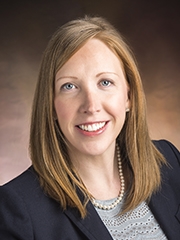 Pediatric pulmonologist and Medical Director of the Lung and Heart/Lung Transplant Program
Pediatric pulmonologist and Medical Director of the Lung and Heart/Lung Transplant ProgramQ: Who or what inspired you to pursue a career in medicine?
A. Thinking back, I was always a very good student, and studying and test taking came easy to me. When I was very young and people would ask me what I wanted to be when I grew up, I thought that being a doctor was the hardest job out there, so I figured I would do that! I also remember always feeling an extreme sense of pride for meeting goals and overcoming challenges in my academic life. There were no physicians in my family, and I wanted to achieve that goal of being the first physician in my family to make my parents proud.
Q: What do you love most about your job?
A. My favorite part about my job is communicating with my patients and their parents and families. I take pride in being able to explain the arduous nuances of complicated lung disease in a way that is easy for families to understand. As a mother, I also enjoy connecting with families on a personal level and expressing empathy for the difficult situations in which they find themselves.
Q: What professional accomplishment are you most proud of?
A. I am most proud of being appointed as the medical director of the Lung and Heart/Lung Transplant Programs.
Q: How important has female mentorship been to your career?
A. Throughout my career, many of my direct mentors have been male. However, I have been surrounded by women who have demonstrated to me the importance of work/life balance. As a mother of four young children, this has been extremely important in my overall job satisfaction.
Q: Although the gender gap has shrunk in the medical field, we still have more work to do. What obstacles do you feel female clinicians face and how can society promote increased female leadership in the field?
A. I would agree that we still have more work to do. In my experience, women (especially those who are mothers) are often criticized by their peers for their need to balance work and their personal life. I do think that this improved somewhat during the COVID-19 pandemic, when the struggles of working mothers became more apparent. Oftentimes, the responsibility for taking care of sick children, activity drop offs and picks ups, making dinner, grocery shopping, homework, you name it, falls on the mother. As a working mom, I can attest to the struggle. Not a week goes by that I don’t have to adjust my schedule in some way to accommodate the needs of one of my children. That being said, my tactic in these cases is just to be honest and open about communicating with my colleagues what my limitations are and how I am going to work around them, and most of the time people get it. I think that open communication and being honest about my need to be both a mother and a physician always helps. In fact, I think most people find it refreshing and validating for their own struggles when I am honest about my own challenges. As a society we need to empathize with women and spark communication and honesty. I hope I can be a role model to other working mothers in the pulmonary divisions, especially for trainees.
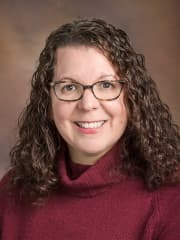 Senior Medical Director, Inpatient Pulmonary and Sleep Services
Senior Medical Director, Inpatient Pulmonary and Sleep ServicesQ: Who or what inspired you to pursue a career in medicine?
A. Since a young age I have been told how doctors have played a crucial role in my own and my father's life. In my case I had pneumonia as a 2-month-old and was sick and hospitalized. My mother spoke with such admiration about my pediatrician who saw me on a holiday evening at his home, admitted me to the hospital and in her words "saved my life." He was my pediatrician until I was 18 years old and was exactly what you think of when you think of the older generation of pediatricians. He knew his patients, he took time to ask questions and was so thorough. In my father's case it was the ophthalmologists that saved his vision and prevented him from going totally blind. Hearing those stories inspired me to become a physician and have that impact in the world.
Q: What do you love most about your job?
A. The favorite part of my job is taking care of a patient from infancy to young adulthood and watching them grow and develop and knowing I played a small role in that. Families confide in you and put their hope and trust in you as their doctor, and to be able to earn that trust is the most rewarding thing for me.
Q: What professional accomplishment are you most proud of?
A. Being appointed the Senior Medical Director for inpatient pulmonary and sleep services. Having my colleagues recognize how I support them and having their trust to represent them to hospital leadership has been great.
Q: How important has female mentorship been to your career?
A. This is a hard question to answer since all my mentors have been men. I have found the comradery of my female colleagues from residency onwards has been a sort of unofficial mentorship. We all learn from each other and have supported each other along the way. Seeing my female colleagues achieve their successes and watching them develop and contribute to medicine, either through research or innovative medical care, has given me the confidence to be more vocal and pursue a leadership position.
Q: Although the gender gap has shrunk in the medical field, we still have more work to do. What obstacles do you feel female clinicians face and how can society promote increased female leadership in the field?
A. I think female clinicians all face the challenge of having to balance their personal responsibilities with their professional ones in a way that men do not. Women have the responsibility of being the primary caretaker in the home, managing the day-to-day activities of life — not only for themselves but for their spouses and children — in a way that men are not expected to. When that comes into conflict with their professional aspirations, they have to make a choice between the two. It’s important to understand that a women's career trajectory might take longer than a man's and that she should not be overlooked for promotion or opportunities just because she is maybe a little older or was not as aggressive at the beginning of her career. Another thing that women tend to do is not be as vocal about their accomplishments and their abilities as men do. So, seeing past the PR and really looking at the contributions female clinicians have made to their fields is necessary to increase female leadership.
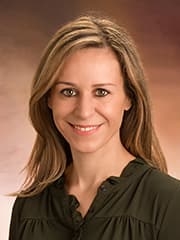 Co-associate Medical Director, Technology Dependence Center
Co-associate Medical Director, Technology Dependence CenterQ: Who or what inspired you to pursue a career in medicine?
A. In elementary school, I was always the kid in science class asking, "Why?" and "How?" and was either met with blank stares or was left disappointed with the ambiguity of the answer. I began volunteering at a local hospital when I was in high school as part of an elective and became fascinated with human physiology. I remember asking one of the endocrinologists about the mechanism of how insulin receptors worked on muscle cells and when he responded, "Do you want the long or the short answer?", I was hooked.
Q: What do you love most about your job?
A. The relationships I form with families is undoubtedly the best part of what I do, and because I focus on children with bronchopulmonary dysplasia, the connections begin early on. The trust that these families instill in us when they're at their most vulnerable is humbling. It constantly motivates me to want to be better and do better.
Q: What professional accomplishment are you most proud of?
A. As a foreign medical graduate who completed residency at a small program, finding out I matched at CHOP for my pulmonary fellowship was an incredibly validating moment.
Q: How important has female mentorship been to your career?
A. I've been fortunate enough to have been guided by incredible mentors during my career, all of whom have been men. Over the last several years, however, it has been exciting to witness brilliant women emerging as experts in their respective fields and ones who are leading the way with groundbreaking scientific research and discoveries. This shift has been apparent in our own division as more than 50% are now women, including our division chief and associate chief. It is my hope that this movement will allow for more female-driven mentoring in every medical specialty.
Q: Although the gender gap has shrunk in the medical field, we still have more work to do. What obstacles do you feel female clinicians face and how can society promote increased female leadership in the field?
A. This is a complex issue because the scale of the problem is multifactorial and extends far beyond the walls of any single institution. First, as a society, we need to address and acknowledge the implicit, and often subconscious, bias that exists against women in the workforce. We also need to address pay inequality, advocate for women mentorship and sponsorship, and promote career development programs. I certainly don't want to be given a leadership role in order to fill someone's quota, but I sure as heck want a fair chance at a role if I'm just as qualified as other candidates.